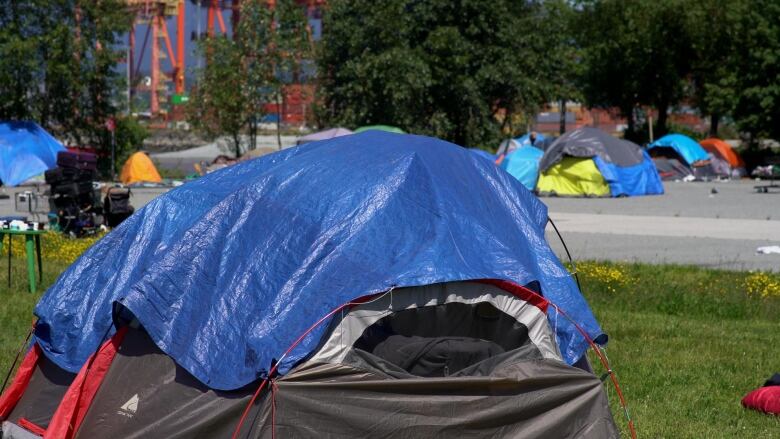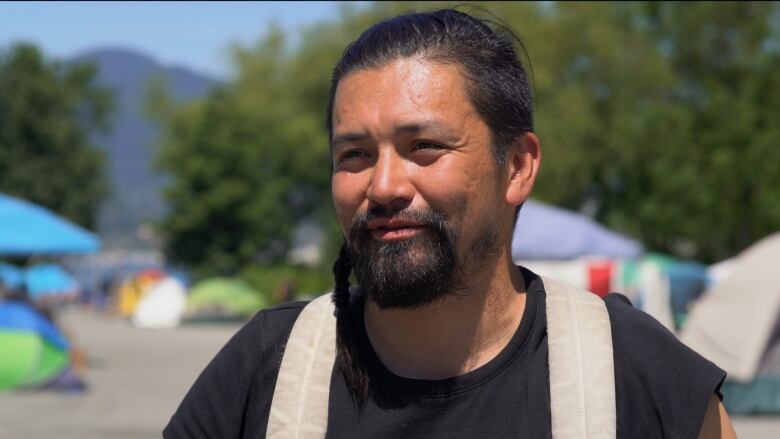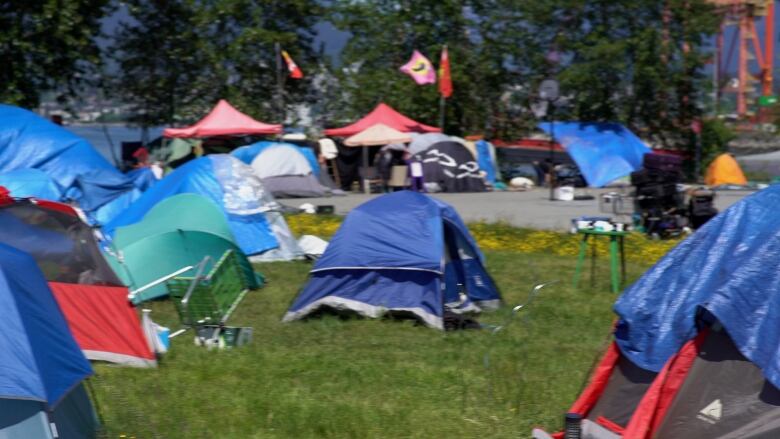Homeless people explain decision to camp by CRAB Park as they prepare to fight port authority injunction
Port Metro Vancouver wants to clear parking lot site where more than 60 people are now sleeping

Members of a new homeless camp near CRAB Park are set to return to court on Thursday to give their arguments in an injunction fight with Port Metro Vancouver.
A B.C. Supreme Court justice granted the group of homeless peoplea one-week delay of the port authority injunction, which said they were trespassing and asked them to vacate the camp by May 28.
"This gives us time to speak to the people living in the camp, get affidavits and prepare our arguments," said Amandeep Singh, a lawyer representing the campers.
Thenew camp was set up shortly after May 8, when the tent city in Oppenheimer Park was closed and the provincial government found housing for more than 300 people who had been living there.
The camp is situated on a port authority parking lot beside CRAB Park.
ChrissyBrett, one of the campers, said she thought the site was part of the park.
"We didn't know this wasn't part of CRAB Park," she said. "And parks are not really made to live in," she added, saying the parking lot offered a flat area of ground to camp on.
'It's safe here and nobody bothers us'
Despite the promise ofshelter, medical attention and access to a safe supply of drugs given to the residents of Oppenheimer Park, many chose instead to keepliving on the streets. The camp by CRAB Park has grown steadily in size and currently has about 60 people.
Their reasons for continuing to sleeprough vary.

Bronson and Elaine have slept in doorways, parks and alleys, they said. They've faced violence and had their few possessions stolen, Bronson said.
The couple made their way to the new camp when they heard there were other Indigenous people there.
"I heard this was like an urban reserve. It's safe here and nobody bothers us," Bronson said. "Living on the streets hasn't been too kind to me, but I lost my wallet here and someone even gave it back."
Tony Pruden said he suffered from depression and was evicted from his Vancouver residence. He lived in shelters afterward, but exhausted the number of days he could stay. He started living on the streets just as Oppenheimer closed, so he made his way to the new camp, he said.
"I have my tent and a few belongings and that's all I have," he said. "If we're evicted from here I'll just wander the streets because I've no place to be."

'Hereditary support' claim
The injunction saysthe site is property of the Vancouver Port Authority and campers are trespassing.
But Brett said the property is unceded land of the Coast Salish people, and says she has secured permission to be there.
"We have matriarch support. We have hereditary support through my biological family, who arefrom one of the local First Nations," she said.Brett didn't clarify which First Nation.
CBC contacted the Musqueam, Tsleil-Waututh and Squamish First Nations to confirm Brett's claim of hereditary support.
Only the Squamish replied, saying it hadn't heard from anyone at the homeless camp. The Musqueam and the Tsleil- Waututh have yet to reply.
But Brett said that doesn't matter.
"We'd like to remind people that elected chiefs and councils are a part of a colonial government system. That is something that's not traditional," she said.












_(720p).jpg)


 OFFICIAL HD MUSIC VIDEO.jpg)
.jpg)



























































































